Ballygar, Co Galway
The weather, the cost of inputs and the price of grain made it a tough year for Conall and all farmers. He is happy to have got 75% of what he had planned to plant this autumn in the ground, which did not look possible a few weeks ago. He was also delighted with the output of his new combine, and says he was blessed to have it in the wet harvest.
Going forward, he hopes to plant less spring crops and is also open to taking more land in reseeding deals rather than leases.
High: The winter barley performed very well for Conall, as it has over the past number of years. His average yield came in at 3.7t/ac.Low: In a challenging year, two things stood out for the wrong reasons. Some spring barley had to be replanted in May due to heavy rain after it was rolled. Conall also did not manage to harvest 3% of his area, consisting of spring barley and oats.Kildalton, Co Kilkenny
‘A perfect storm’ is how Damien describes this year for tillage farmers. It has been one thing after another for the past 12 months.
He says the weather has been horrific, with both wet and dry conditions affecting him. However, he says that you have to be optimistic things will get better at some stage.
Damien is pleased that the winter barley has emerged well on the farm, but there are still wheat and oats to plant, as well as maize to harvest.
High: The only pleasing crop this year was winter oilseed rape. It yielded 2t/ac with 140kg/ha of nitrogen applied. Damien says that he would be happy with that in any year.Low: The one thing that really got to Damien this year was the secondary regrowth in spring crops at harvest. The crops were looking more green every day, and it was the final nail in the coffin after a tough year.Bunclody, Co Wexford
The lows are sticking out for Patrick when reviewing the year rather than the highs. He says that failing to get winter cereals planted last autumn put him on the back-foot from the beginning, but that he cannot complain too much when he sees photos of unharvested crops and other fields under water.
However, the last couple of fields to be cut were very broken down, so it is difficult to be upbeat about the year.
High: It’s a struggle for Patrick to find a high, but the good weather windows for spraying and fertilising, in addition to a good year for grass growth, come to mind.Low: The late start to drilling on 9 April caused problems for Patrick. His ewes started lambing around this time, as he is usually finished planting, leading to a very hectic few weeks.Seaforde, Co Down
The dry February led to excellent conditions for planting beans, and applying fertiliser and sprays. The weather took a turn for the worst in March and April, disrupting fieldwork.
The June drought affected Neill badly on his light land, before the rain returned to create a difficult harvest. However, he says that all the challenges this year were out of the farmer’s control, from input costs to the weather.
While he will be cautious on input spending next year, he notes that fertiliser and sprays are needed to produce a good crop.
High: The harvest ended on a high with the maize. It was harvested earlier than usual, resulting in good ground conditions. It yielded 18t/ac at 32% DM.Low: It was the earlier part of the harvest that caused issues for Neill. There was straw lying on the ground for five weeks, which delayed the establishment of stubble turnips.Castledermot,
Co Kildare
The increased spring workload for the O’Gorman brothers, because of a wet end to 2022, was further delayed until the end of April by persistent rain. The immediate change from too wet to too dry in June seems to have hurt yields a lot in Kevin’s area.
The potatoes were planted six weeks late in some cases, and they did not enjoy the wet, dull summer either. Harvesting is continuing, but it is also becoming a struggle.
High: Kevin finds it difficult to remember a high this year and remarks that last year, it was difficult to think of a low. Potato quality was pretty good, benefitting from good scab control in the moist soil conditions.Low: The high input costs meant that the stakes were a lot higher in a poor year. Kevin says they need to come back in line with grain prices for tillage farming to remain viable.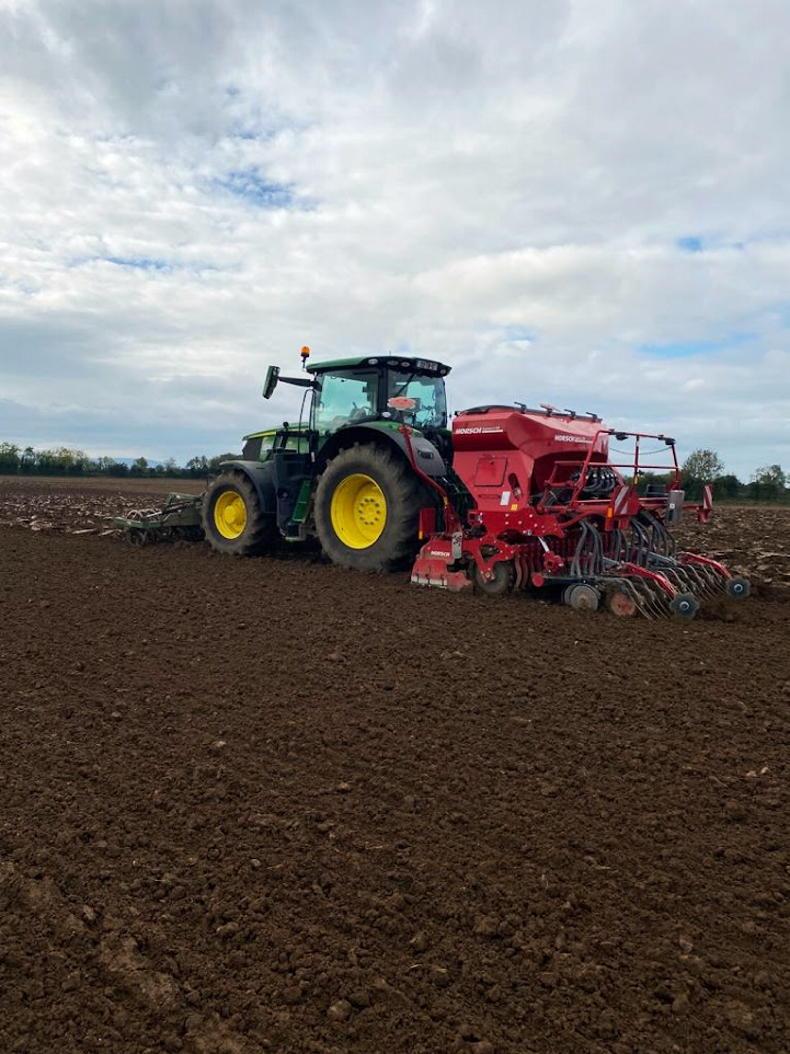
The Brennan brothers sowing winter wheat after potatoes for the O'Gorman brothers in Co Kildare.
Tullow, Co Carlow
Jack is happy to have his off-farm income this year, even if it is becoming more demanding to balance this and the farm workload. While the agroforestry and multispecies sward went well this year, the cereal crops disappointed.
Jack took a two-pronged approach to selling his grain this year, through an established buyer, and also through exploring new markets with new people to see what opportunities lie ahead in the next number of years.
High: The Irish Organic Association walk on his farm in July. The weather was good, the farm looked well, and Jack found it great to get to talk to others interested in the organics sector.Low: Jack found it tough to watch the weeds take over in the cereal crops during the wet July and August. It made him wonder what could have been done differently, and it had subsequent effects on his harvesting and grain quality.Cashel, Co Tipperary
It was a challenging year from start to finish for Mark. He says that January and February were too dry, and we paid for it for in the rest of the year.
While yields were average, the uncontrollable weather and prices hurt farmers. He will see what the cost of fertiliser is next spring, but he will probably plant more beans and spring oats, and try to keep the rotation right on the farm.
He says that the Government, co-ops, and merchants need to support farmers now after a very tough year.
High: Driving the combine into the shed after finishing the harvest was a big relief for Mark. He feels for all those who did not manage to get all their crops harvested this year.Low: The poor weather began in March and it has not improved since then. Mark still has beet in the ground, with water lying in the fields.Street, Co Westmeath
The harvest finally finished for Alex last week with the maize, but the tow chain was in high demand throughout. It was a fitting end to what Alex describes as the toughest harvest he’s seen.
The harvest was exceptionally long, over three months, and most crops suffered from a lack of sunlight throughout the summer.
Alex will maximise the amount of organic manure he can import next year. He sees it as a way to combat high prices and take some control over input costs.
High: Managing to break-even on spring barley was a huge relief for Alex. It was very stressful during the year and it was an added bonus to break-even.Low: Starting the harvest in tough conditions in the winter barley was the low point for Alex. It was a sign of things to come, and the straw was not baled for weeks with the continued rain.Limavady, Co Derry
It was a frustrating year for Alistair. Despite the crops looking well earlier in the year, they just did not yield.
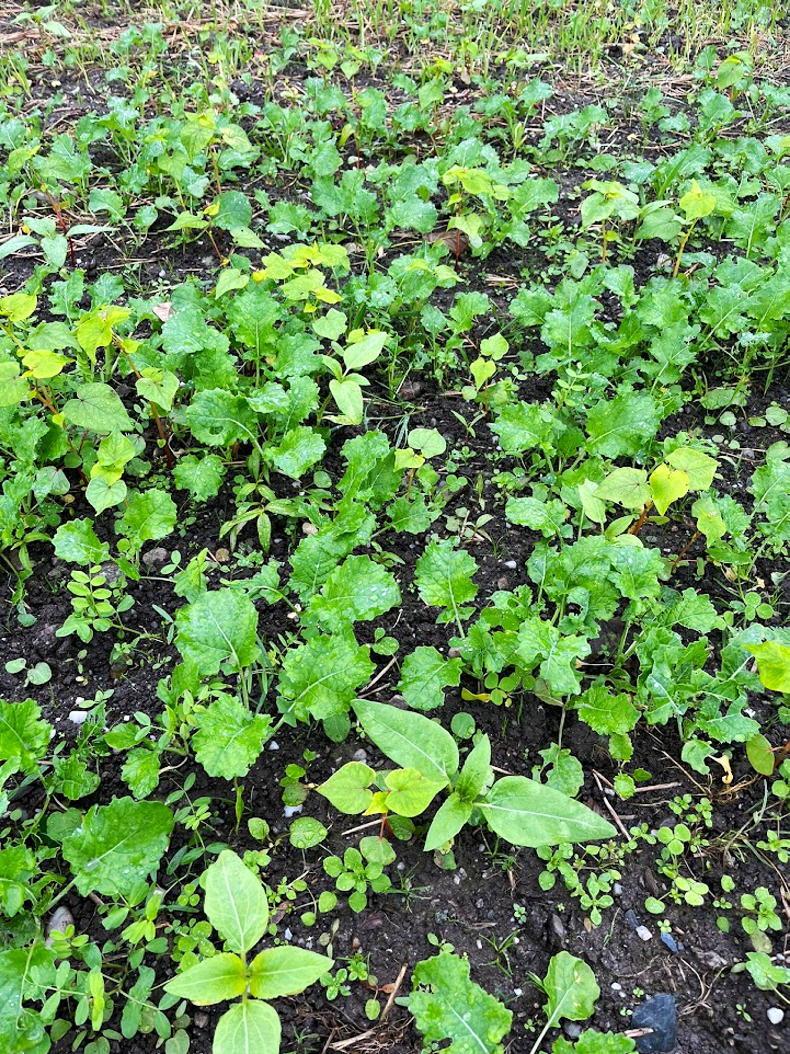
The oilseed rape and companion crops are well established on Alistair Craig's farm in Co Derry.
He was happy that a crop rotation was implemented this year, instead of continuous barley.
Barley had consistently yielded 4t/ac on the farm for many years, but it has started to fail recently, with an average this year of 2.8t/ac. He does not know whether the weather or a lack of chemistry is causing this.
High: The move to min-till was the highlight for Alistair. Establishment has been good and the companion crops have been a success. The winter rye and oilseed rape, both being grown for the first time, were the best crops on the farm.Low: Despite Alistair learning not to get too down about the weather over the past number of years, it was hard not to this year. The wet autumn caused more problems for Alistair than the wet harvest, when work was able to be completed between the showers.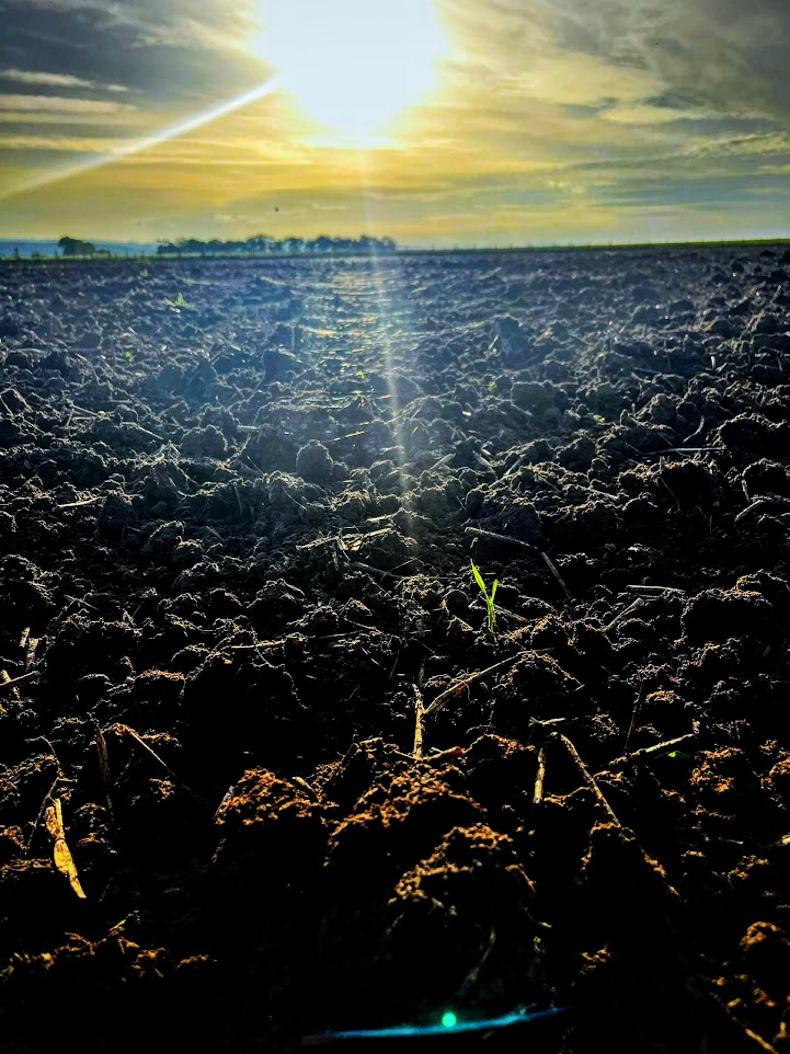
A single barley plant emerges in the autumn sun on Alistair Craig's farm in Co Derry.
Balbriggan, Co Dublin
The rain and a drought have both been big issues for Tony this year.
He has not got as much winter planting completed as he would have liked, and the maize harvest is a struggle, with average crops and a lot of damage from storm Babet.
Selling maize this year has been more difficult, with many farmers having lots of silage and opting for cheaper imported grains.
Tony says that these market dynamics have to change, and it brings into question the double standards of the EU, in terms of domestic food production versus imports.
High: Tony’s soil is still improving despite the wet year, in terms of trafficability, structure and fertility.Low: The late planting of the maize, which led to a late harvest and poor yields, was the low point for Tony. It affected the profitability of the crop more than could have been expected.Slane, Co Meath
After a tough year in Meath, Eamonn says that the best thing to do now is to park it and move on. Yields were ok, everything was harvested, and all winter barley and wheat were planted.
Whether all of this grows is yet to be seen. The focus next year will be on trying to reduce expenditure, but this is not easy to do. The mood in the sector is very low, and the recently announced supports have done little to improve this.
High: While there are not too many highs, Eamonn says the fact that his area escaped the worst of the weather, allowing harvesting and sowing to be completed, was the biggest plus from the year.Low: Input costs were the real issue this year. It’s not sustainable for farmers to operate at that level of exposure, and now the tax is due for last year’s good returns too. 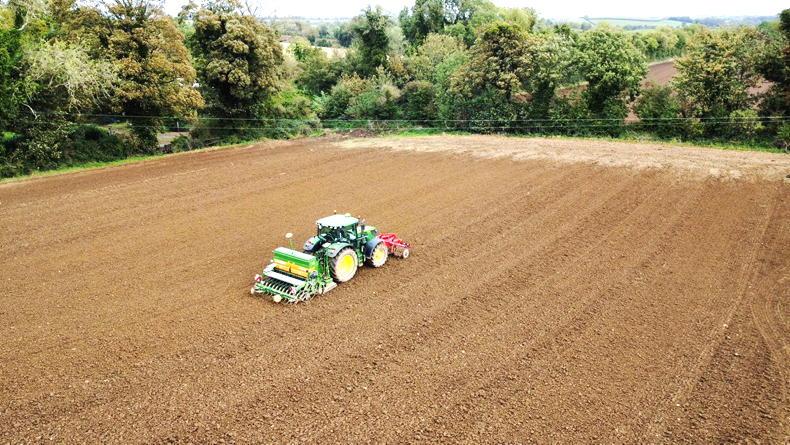
Planting of winter cereals on Eamonn Cogan's farm in Co Meath.
Shanagarry, Co Cork
John summarises this year as a battle. From October 2022 up to now, there has never been a let up. John is glad that it was still a relatively good year on his farm, with a reasonable profit margin and little to no land damage.
John is very aware that many growers are having a difficult year and says farming is not an easy occupation, but we stick at it because we love it. He urges farmers to have a simple chat with a friend or get away from the farm for a day-trip or short break, to try to distract from the current difficulties.
High: John mentions a few highs this year: a crop rotation, spreading the workload and risk; an excellent local contractor; winter wheat delivering once again; and the Straw Incorporation Measure. Low: The biggest low is the current wet weather upsetting John’s crop rotation for the next few years.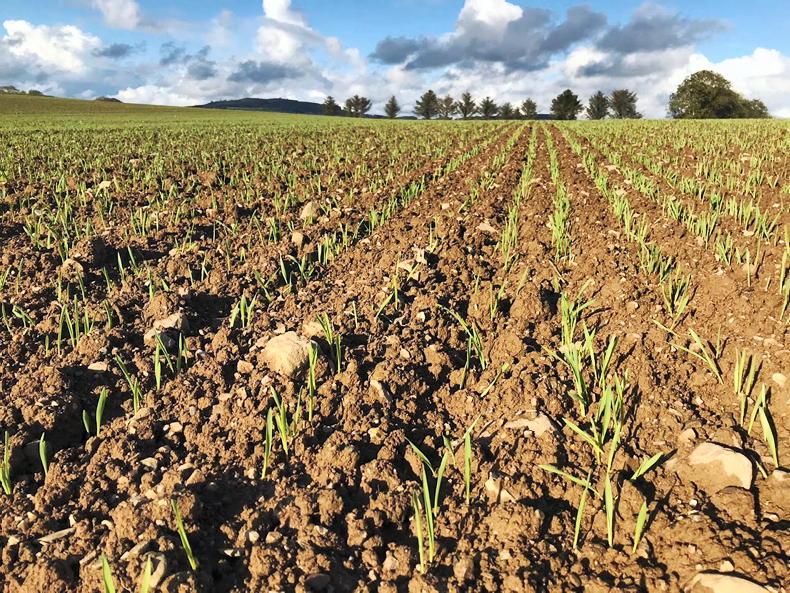
KWS Tardis winter barley emerging at Kildalton College. It was planted on 9 October at 200kg/ha.
Ballygar, Co Galway
The weather, the cost of inputs and the price of grain made it a tough year for Conall and all farmers. He is happy to have got 75% of what he had planned to plant this autumn in the ground, which did not look possible a few weeks ago. He was also delighted with the output of his new combine, and says he was blessed to have it in the wet harvest.
Going forward, he hopes to plant less spring crops and is also open to taking more land in reseeding deals rather than leases.
High: The winter barley performed very well for Conall, as it has over the past number of years. His average yield came in at 3.7t/ac.Low: In a challenging year, two things stood out for the wrong reasons. Some spring barley had to be replanted in May due to heavy rain after it was rolled. Conall also did not manage to harvest 3% of his area, consisting of spring barley and oats.Kildalton, Co Kilkenny
‘A perfect storm’ is how Damien describes this year for tillage farmers. It has been one thing after another for the past 12 months.
He says the weather has been horrific, with both wet and dry conditions affecting him. However, he says that you have to be optimistic things will get better at some stage.
Damien is pleased that the winter barley has emerged well on the farm, but there are still wheat and oats to plant, as well as maize to harvest.
High: The only pleasing crop this year was winter oilseed rape. It yielded 2t/ac with 140kg/ha of nitrogen applied. Damien says that he would be happy with that in any year.Low: The one thing that really got to Damien this year was the secondary regrowth in spring crops at harvest. The crops were looking more green every day, and it was the final nail in the coffin after a tough year.Bunclody, Co Wexford
The lows are sticking out for Patrick when reviewing the year rather than the highs. He says that failing to get winter cereals planted last autumn put him on the back-foot from the beginning, but that he cannot complain too much when he sees photos of unharvested crops and other fields under water.
However, the last couple of fields to be cut were very broken down, so it is difficult to be upbeat about the year.
High: It’s a struggle for Patrick to find a high, but the good weather windows for spraying and fertilising, in addition to a good year for grass growth, come to mind.Low: The late start to drilling on 9 April caused problems for Patrick. His ewes started lambing around this time, as he is usually finished planting, leading to a very hectic few weeks.Seaforde, Co Down
The dry February led to excellent conditions for planting beans, and applying fertiliser and sprays. The weather took a turn for the worst in March and April, disrupting fieldwork.
The June drought affected Neill badly on his light land, before the rain returned to create a difficult harvest. However, he says that all the challenges this year were out of the farmer’s control, from input costs to the weather.
While he will be cautious on input spending next year, he notes that fertiliser and sprays are needed to produce a good crop.
High: The harvest ended on a high with the maize. It was harvested earlier than usual, resulting in good ground conditions. It yielded 18t/ac at 32% DM.Low: It was the earlier part of the harvest that caused issues for Neill. There was straw lying on the ground for five weeks, which delayed the establishment of stubble turnips.Castledermot,
Co Kildare
The increased spring workload for the O’Gorman brothers, because of a wet end to 2022, was further delayed until the end of April by persistent rain. The immediate change from too wet to too dry in June seems to have hurt yields a lot in Kevin’s area.
The potatoes were planted six weeks late in some cases, and they did not enjoy the wet, dull summer either. Harvesting is continuing, but it is also becoming a struggle.
High: Kevin finds it difficult to remember a high this year and remarks that last year, it was difficult to think of a low. Potato quality was pretty good, benefitting from good scab control in the moist soil conditions.Low: The high input costs meant that the stakes were a lot higher in a poor year. Kevin says they need to come back in line with grain prices for tillage farming to remain viable.
The Brennan brothers sowing winter wheat after potatoes for the O'Gorman brothers in Co Kildare.
Tullow, Co Carlow
Jack is happy to have his off-farm income this year, even if it is becoming more demanding to balance this and the farm workload. While the agroforestry and multispecies sward went well this year, the cereal crops disappointed.
Jack took a two-pronged approach to selling his grain this year, through an established buyer, and also through exploring new markets with new people to see what opportunities lie ahead in the next number of years.
High: The Irish Organic Association walk on his farm in July. The weather was good, the farm looked well, and Jack found it great to get to talk to others interested in the organics sector.Low: Jack found it tough to watch the weeds take over in the cereal crops during the wet July and August. It made him wonder what could have been done differently, and it had subsequent effects on his harvesting and grain quality.Cashel, Co Tipperary
It was a challenging year from start to finish for Mark. He says that January and February were too dry, and we paid for it for in the rest of the year.
While yields were average, the uncontrollable weather and prices hurt farmers. He will see what the cost of fertiliser is next spring, but he will probably plant more beans and spring oats, and try to keep the rotation right on the farm.
He says that the Government, co-ops, and merchants need to support farmers now after a very tough year.
High: Driving the combine into the shed after finishing the harvest was a big relief for Mark. He feels for all those who did not manage to get all their crops harvested this year.Low: The poor weather began in March and it has not improved since then. Mark still has beet in the ground, with water lying in the fields.Street, Co Westmeath
The harvest finally finished for Alex last week with the maize, but the tow chain was in high demand throughout. It was a fitting end to what Alex describes as the toughest harvest he’s seen.
The harvest was exceptionally long, over three months, and most crops suffered from a lack of sunlight throughout the summer.
Alex will maximise the amount of organic manure he can import next year. He sees it as a way to combat high prices and take some control over input costs.
High: Managing to break-even on spring barley was a huge relief for Alex. It was very stressful during the year and it was an added bonus to break-even.Low: Starting the harvest in tough conditions in the winter barley was the low point for Alex. It was a sign of things to come, and the straw was not baled for weeks with the continued rain.Limavady, Co Derry
It was a frustrating year for Alistair. Despite the crops looking well earlier in the year, they just did not yield.

The oilseed rape and companion crops are well established on Alistair Craig's farm in Co Derry.
He was happy that a crop rotation was implemented this year, instead of continuous barley.
Barley had consistently yielded 4t/ac on the farm for many years, but it has started to fail recently, with an average this year of 2.8t/ac. He does not know whether the weather or a lack of chemistry is causing this.
High: The move to min-till was the highlight for Alistair. Establishment has been good and the companion crops have been a success. The winter rye and oilseed rape, both being grown for the first time, were the best crops on the farm.Low: Despite Alistair learning not to get too down about the weather over the past number of years, it was hard not to this year. The wet autumn caused more problems for Alistair than the wet harvest, when work was able to be completed between the showers.
A single barley plant emerges in the autumn sun on Alistair Craig's farm in Co Derry.
Balbriggan, Co Dublin
The rain and a drought have both been big issues for Tony this year.
He has not got as much winter planting completed as he would have liked, and the maize harvest is a struggle, with average crops and a lot of damage from storm Babet.
Selling maize this year has been more difficult, with many farmers having lots of silage and opting for cheaper imported grains.
Tony says that these market dynamics have to change, and it brings into question the double standards of the EU, in terms of domestic food production versus imports.
High: Tony’s soil is still improving despite the wet year, in terms of trafficability, structure and fertility.Low: The late planting of the maize, which led to a late harvest and poor yields, was the low point for Tony. It affected the profitability of the crop more than could have been expected.Slane, Co Meath
After a tough year in Meath, Eamonn says that the best thing to do now is to park it and move on. Yields were ok, everything was harvested, and all winter barley and wheat were planted.
Whether all of this grows is yet to be seen. The focus next year will be on trying to reduce expenditure, but this is not easy to do. The mood in the sector is very low, and the recently announced supports have done little to improve this.
High: While there are not too many highs, Eamonn says the fact that his area escaped the worst of the weather, allowing harvesting and sowing to be completed, was the biggest plus from the year.Low: Input costs were the real issue this year. It’s not sustainable for farmers to operate at that level of exposure, and now the tax is due for last year’s good returns too. 
Planting of winter cereals on Eamonn Cogan's farm in Co Meath.
Shanagarry, Co Cork
John summarises this year as a battle. From October 2022 up to now, there has never been a let up. John is glad that it was still a relatively good year on his farm, with a reasonable profit margin and little to no land damage.
John is very aware that many growers are having a difficult year and says farming is not an easy occupation, but we stick at it because we love it. He urges farmers to have a simple chat with a friend or get away from the farm for a day-trip or short break, to try to distract from the current difficulties.
High: John mentions a few highs this year: a crop rotation, spreading the workload and risk; an excellent local contractor; winter wheat delivering once again; and the Straw Incorporation Measure. Low: The biggest low is the current wet weather upsetting John’s crop rotation for the next few years.
KWS Tardis winter barley emerging at Kildalton College. It was planted on 9 October at 200kg/ha.











 This is a subscriber-only article
This is a subscriber-only article










SHARING OPTIONS: